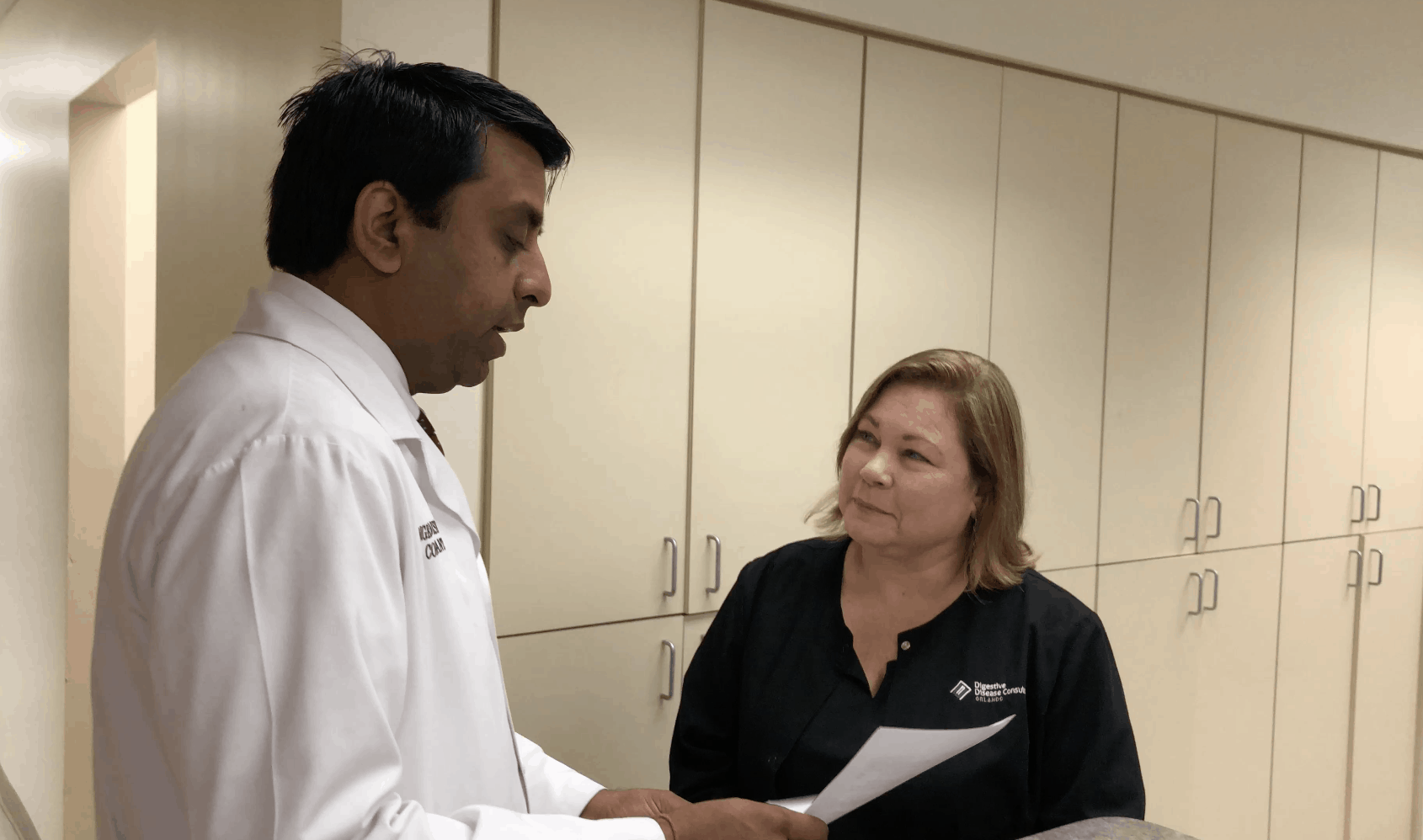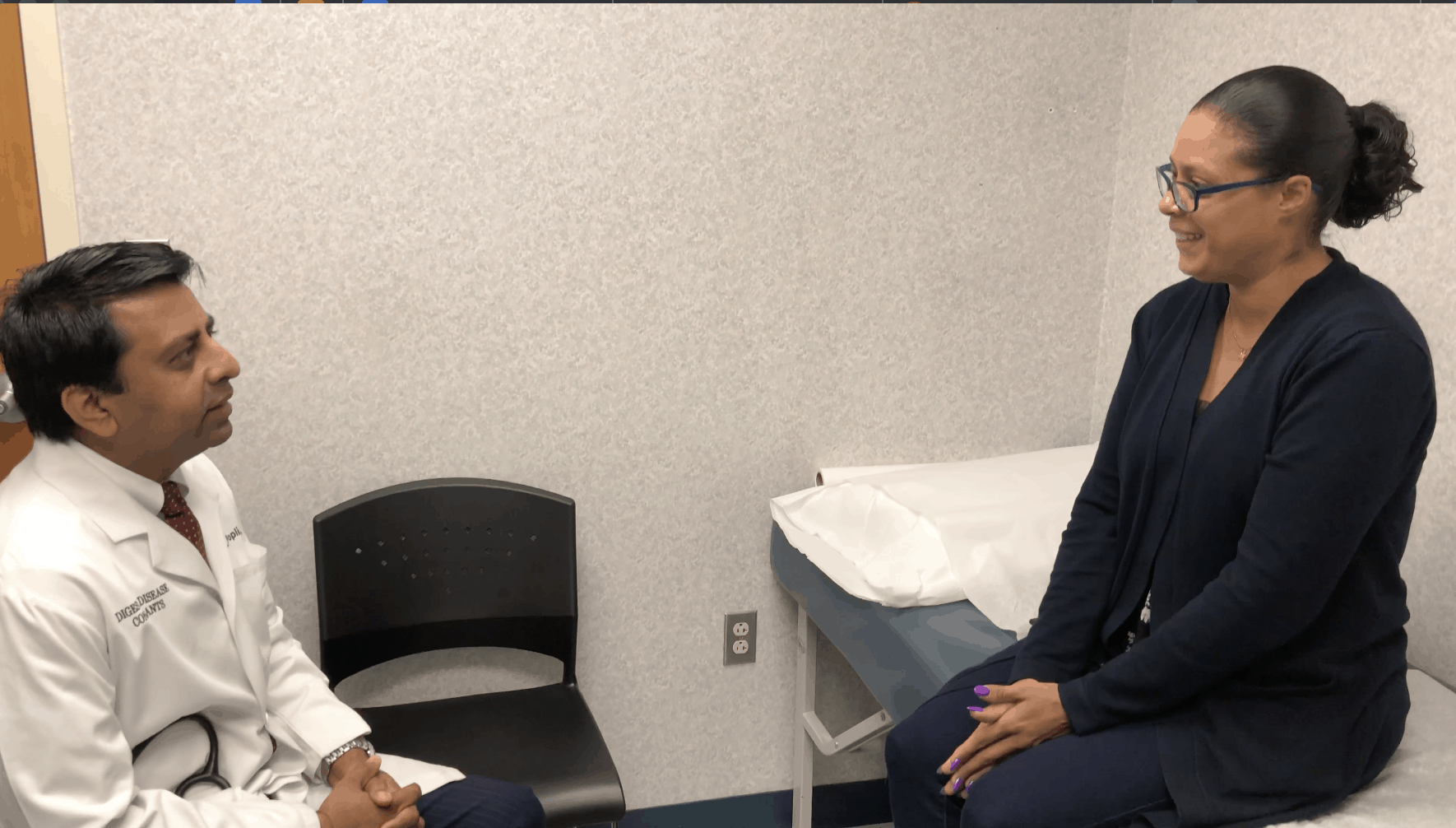- What causes a peptic ulcer?
- What are the symptoms of peptic ulcer disease?
- Is my peptic ulcer treatable?
Peptic ulcers are sores that can develop on the inside lining of your stomach (gastric ulcer) or the upper portion of the small intestine that connects to the stomach (duodenal ulcer).
Normally, the digestive tract is lined with a protective mucous layer to guard against the acid that breaks down food. A peptic ulcer can occur when the acid in the digestive tract wears away the inside surface of the small intestine or stomach. This can create an open sore, which can become painful, irritated, and may even bleed.
An ulcer is a sign of a serious medical condition called peptic ulcer disease that affects more than 4.5 million people in the U.S. each year. Despite what the phrase implies, stress doesn’t cause this illness. Peptic ulcer disease is diagnosed with tests in your doctor’s office and these conditions, while sometimes uncomfortable or even painful, are very treatable and even curable.
Dr. Raaj K. Popli, board-certified specialist in internal medicine and gastroenterology at Digestive Disease Consultants, commonly treats these conditions. He defines Peptic ulcer disease as “a defect in the wall of the stomach or the first part of the small intestine.”
What are the causes and symptoms of peptic ulcer disease and what treatments are available to help you recover?
What Causes a Peptic Ulcer?
 There are two primary known causes of peptic ulcer disease. The first is the regular use of common over-the-counter or prescribed medications that irritate the lining of the stomach and small intestine. Dr. Popli says, “Certain medications, especially the nonsteroidal anti-inflammatory drugs (NSAIDs) such as Ibuprofen, Motrin, Aleve, Naproxen, even aspirin have been associated with peptic ulcer disease.” Taking other medications along with NSAIDs can accelerate the problem, such as anticoagulants, low-dose aspirin, steroids, or other compounds.
There are two primary known causes of peptic ulcer disease. The first is the regular use of common over-the-counter or prescribed medications that irritate the lining of the stomach and small intestine. Dr. Popli says, “Certain medications, especially the nonsteroidal anti-inflammatory drugs (NSAIDs) such as Ibuprofen, Motrin, Aleve, Naproxen, even aspirin have been associated with peptic ulcer disease.” Taking other medications along with NSAIDs can accelerate the problem, such as anticoagulants, low-dose aspirin, steroids, or other compounds.
The second cause of peptic ulcer disease is from a common type of stomach bacteria called helicobacter pylori (H. pylori) that causes an infection in the stomach. Researchers suggest that H. pylori is likely the most common cause of peptic ulcers and up to 40% of the U.S. population are diagnosed with these infections each year. H. pylori usually doesn’t cause symptoms, but when it does, peptic ulcer disease is the most common complaint. Interestingly we’re not certain exactly how H. pylori spreads; possibly through contact with an infected person’s saliva, or unclean food or water.
No matter the cause, a peptic ulcer can cause symptoms that signal a visit to the doctor is necessary. What are those symptoms?
What are the Symptoms of Peptic Ulcer Disease?
The most common symptom of an ulcer is abdominal discomfort. Dr. Popli says, “Sometimes it’s very sharp but it can also be burning and cramping as well. In addition to this people will also get associated nausea, bloating, and even atypical symptoms such as even chest pain that is reflux related as well.”
Typically, the early symptoms of peptic ulcer disease can include:
- A dull, kind of gnawing stomach ache
- An aching in the middle of the night when the stomach is empty
- Discomfort that comes and goes for a few days or weeks
- Pain two to three hours after mealtime
These symptoms may be alleviated by eating or with over-the-counter antacids. Over time you may experience additional symptoms such as:
- Bloating
- Burping
- Nausea
- Poor appetite
- Vomiting
- Weight loss
A peptic ulcer can also cause serious symptoms that require emergency treatment. This could include:
- Bloody or black stools
- Bloody vomit or vomit that resembles coffee grounds
- Severe, sharp, sudden, and persistent stomach pain
Any of these symptoms could signal that the ulcer has broken a blood vessel in the stomach or that it has perforated or burrowed deeply into the lining of the stomach or intestines. It could also signal that the ulcer has blocked the path of food that is trying to pass through the stomach. If you experience any of these symptoms seek treatment immediately.
Is my Peptic Ulcer Treatable?
 Peptic ulcer disease is very treatable and the ulcers will heal. Dr. Popli says, “The treatment is of course removing any offending agent, such as those medications and treatment of the H. pylori. It also involves very powerful antacid medicines as well, which will heal the ulcers.”
Peptic ulcer disease is very treatable and the ulcers will heal. Dr. Popli says, “The treatment is of course removing any offending agent, such as those medications and treatment of the H. pylori. It also involves very powerful antacid medicines as well, which will heal the ulcers.”
To determine whether your abdominal pain is caused by peptic ulcer disease your doctor may order one or several tests, including:
- An endoscopy is an exam that uses a thin lighted tube with a small camera (an endoscope) to look inside the stomach and duodenum
- An upper gastrointestinal series (upper GI), which is an x-ray of the esophagus, stomach, and duodenum
- Blood, breath, tissue, and stool samples to look for the presence of H. pylori
Treatment of a peptic ulcer is determined by the cause itself. If H. pylori is the cause of the peptic ulcer, there are a variety of antibiotics that can heal it, including amoxicillin, clarithromycin, metronidazole, and tetracycline. Your doctor may also prescribe H2 blockers to help lessen stomach acid such as cimetidine, famotidine, nizatidine, or ranitidine. Other stomach acid reducers today are the class of proton pump inhibitors such as lansoprazole, omeprazole, or rabeprazole. The doctor could also prescribe a stomach lining protector such as bismuth subsalicylate.
Typically, H. pylori peptic ulcers are treated with medications to kill the bacteria, then additional medications to reduce stomach acid, protect the lining of the stomach, and allow the ulcer to heal.
If you are experiencing any of the symptoms of a peptic ulcer, such as stomach pain or something even more concerning, Dr. Popli says “It’s important to get those checked and evaluated if you have any of those associated symptoms.”
